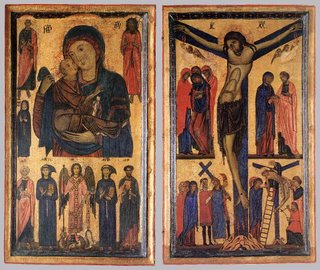His Holiness Pope John Paul II
Encyclical Letter, August 6, 1993
Mary, Mother of Mercy
118. Let us entrust ourselves, the sufferings and the joys of our life, the moral life of believers and people of good will, and the research of moralists, to Mary, Mother of God and Mother of Mercy.
 Mary is Mother of Mercy because her Son, Jesus Christ, was sent by the Father as the revelation of God's mercy (cf. Jn 3:16-18). Christ came not to condemn but to forgive, to show mercy (cf. Mt 9:13). And the greatest mercy of all is found in his being in our midst and calling us to meet him and to confess, with Peter, that he is "the Son of the living God" (Mt 16:16). No human sin can erase the mercy of God, or prevent him from unleashing all his triumphant power, if we only call upon him. Indeed, sin itself makes even more radiant the love of the Father who, in order to ransom a slave, sacrificed his Son: his mercy towards us is Redemption.
Mary is Mother of Mercy because her Son, Jesus Christ, was sent by the Father as the revelation of God's mercy (cf. Jn 3:16-18). Christ came not to condemn but to forgive, to show mercy (cf. Mt 9:13). And the greatest mercy of all is found in his being in our midst and calling us to meet him and to confess, with Peter, that he is "the Son of the living God" (Mt 16:16). No human sin can erase the mercy of God, or prevent him from unleashing all his triumphant power, if we only call upon him. Indeed, sin itself makes even more radiant the love of the Father who, in order to ransom a slave, sacrificed his Son: his mercy towards us is Redemption.This mercy reaches its fullness in the gift of the Spirit who bestows new life and demands that it be lived. No matter how many and great the obstacles put in his way by human frailty and sin, the Spirit, who renews the face of the earth, makes possible the miracle of the perfect accomplishment of the good. This renewal, which gives the ability to do what is good, noble, beautiful, pleasing to God and in conformity with his will, is in some way the flowering of the gift of mercy, which offers liberation from the slavery of evil and gives the strength to sin no more. Through the gift of new life, Jesus makes us sharers in his love and leads us to the Father in the Spirit.
119. Such is the consoling certainty of Christian faith, the source of its profound humanity and extraordinary simplicity. At times, in the discussions about new and complex moral problems, it can seem that Christian morality is in itself too demanding, difficult to understand and almost impossible to practice. This is untrue, since Christian morality consists, in the simplicity of the Gospel, in following Jesus Christ, in abandoning oneself to him, in letting oneself be transformed by his grace and renewed by his mercy, gifts which come to us in the living communion of his Church. Saint Augustine reminds us that "he who would live has a place to live, and has everything needed to live. Let him draw near, let him believe, let him become part of the body, that he may have life. Let him not shrink from the unity of the members."
No comments:
Post a Comment